Can you put the fridge next to the oven in a kitchen layout?
The experts tell us all we need to know about where to put appliances in a kitchen

There are so many things to consider when designing a kitchen. Whether fridge next to oven is the right approach is just one of many big questions that need to be decided early on in the process.
Kitchen layouts vary wildly, but there are universal considerations to be taken into account. These include the must-have appliances, and how they should be places to work most efficiently and look best in site. The three most important appliances are the oven, fridge and sink, so these take top billing.
These three come together to help form what is known as the 'working triangle' or 'kitchen triangle'. While there's a debate of how relevant it is as kitchens evolved, it's still important to be aware of before you consider fridge next to oven, or a different approach.
'Don’t cram any appliance together, especially these three items in one space in the kitchen,' advises Andy Briggs, Interior Designer at Optiplan Kitchens. 'Restrictive movement will always create unnecessary stress, especially if more than one person is using the kitchen at once!'
Can you put the fridge next to the oven in a kitchen layout?
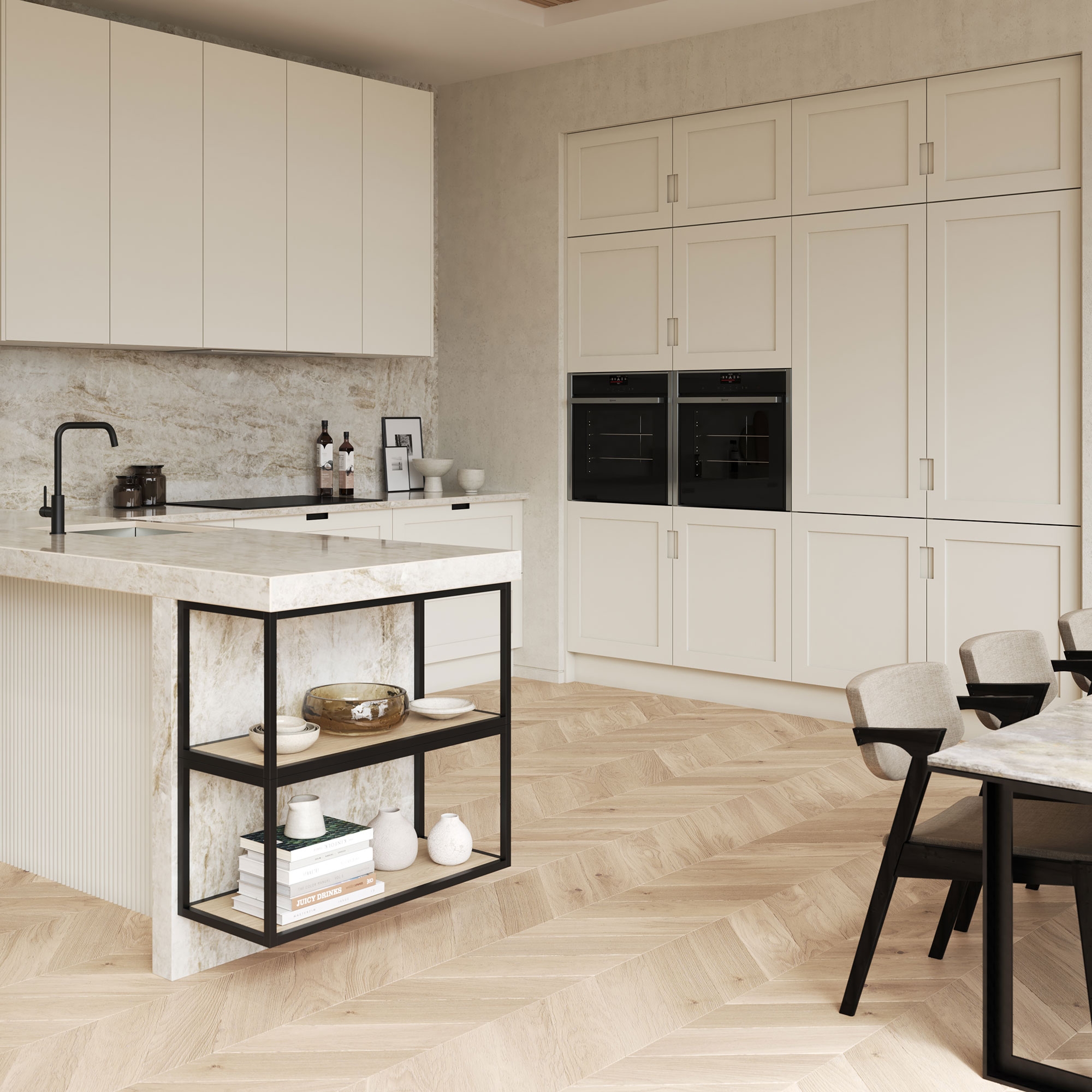
So now that we've established what the working triangle of the oven, sink and fridge is, we have to consider whether fridge next to oven is the right way to go. In short, it's fine to do so, but there are things to keep in mind.
If you're wondering why this is such a popular question, the answer is that it used to be a no-go. 'Traditionally it was advised that ovens and fridges should be separated due to the fridge needing to work extra hard to stay cool,' says Ashleigh Hanwell, Senior Designer at Second Nature Kitchens.
'However most modern integrated fridge freezers have much better insulation and integrated cooling system which will prevent any pass over heat from ovens.'These days, with modern developments, you're less likely to run into problems keeping the two together.
Get the Ideal Home Newsletter
Sign up to our newsletter for style and decor inspiration, house makeovers, project advice and more.
That said, you can take extra precautions. 'I would recommend adding a vent in the plinth to ensure air circulation and help with any concerns,' adds Ashleigh, 'but I would also always read the manufacturer instructions to ensure they don’t oppose it.'
With the modern appliances we're likely to have in our kitchens these days, it's really more a practicality than a necessity to not have fridge next to oven in your layout. 'We find that homeowners usually prefer to have some cupboard space between an oven and a fridge-freezer when creating a bank of appliances', notes Simon Bodsworth. 'So there is enough room for bakeware and pans, as well as adequate clearance when opening doors.'
'To be on the safe side, I would recommend that you have at least 50mm between the appliances and check with your kitchen designer to ensure that your chosen new appliances will be easy to maintain and access with a side-by-side arrangement.'
This 50mm gap also gives you extra breathing room in case either appliances omits too much heat or coolness.
Where should a fridge go in a kitchen?
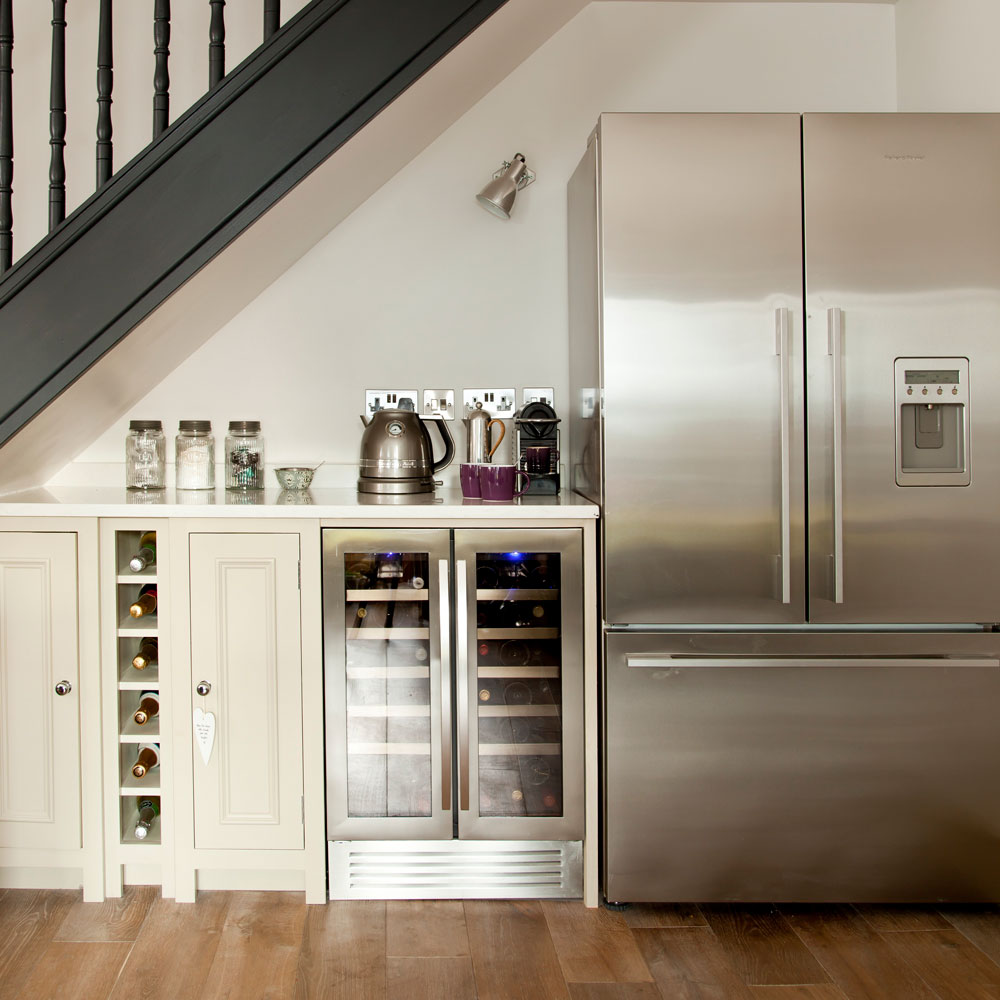
Since appliances have developed so much in recent years, you have a lot more flexibility when it comes to choosing how to lay out your kitchen. Similarly, while the working triangle is a useful starting point, it isn't the be all and end all.
'The appliance choice is key to the success of any design,' says Tom Howley, Design Director of Tom Howley Kitchens. 'A mix of cutting-edge appliances will give you more and you don’t need to compromise on the overall design to get this. By positioning all the appliances within a workable distance of each other provides the chef complete flexibility.'
'Position your large appliances like fridges and wine coolers near to the dining area in your kitchen,' Tom suggests. 'This allows the family easy access to drinks and snacks whilst not getting in the way of the main cooking area.'
Consider day to day practicalities, too. 'It’s always best to put a fridge next to or opposite an empty worktop space, so that it’s best placed next to the area where you prepare your food, reducing unnecessary movement and twisting,' advises Andy Briggs. 'Making sure the fridge door is open for a short amount of time as possible, is great for saving energy and time.'
Ashleigh Hanwell agrees. 'My advice would be for it to be in a location where its easily accessible. Also close to worksurface space to ensure unloading shopping bags will be prompt and also giving a setting space when gathering items to prepare for cooking.'
Can you put a fridge next to a sink?
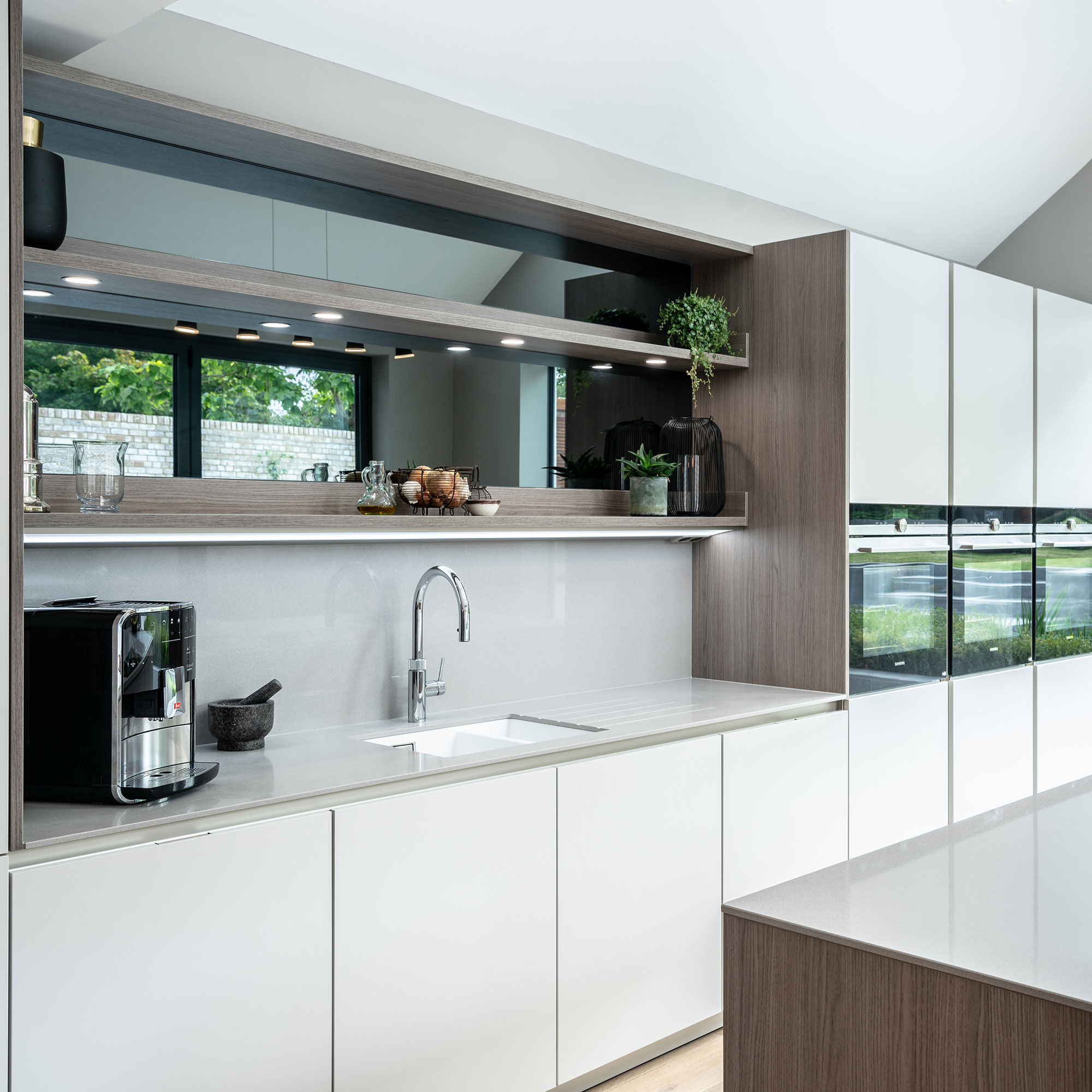
Once you've decided whether fridge next to oven is the route you want to take or not, there's another aspect of the key appliances to consider - the sink.
Most experts seem to agree that aside from giving yourself some breathing room, there's no reason why fridge and sink shouldn't sit together. 'There are no restrictions for placing a fridge next to a sink,' says Paulina Richardson, Creative Designer at Life Kitchens.
'That's as long as you have considered leaving space for a drainer and that the worksurface has enough stability.'
Ashleigh Hanwell agrees. ' I would always recommend a little bit of space personally to allow for a better working environment. But if it is going next to the sink I would just be aware of what direction the door hinges and whether you can alter it if opens into the space.'
However, some kitchen experts prefer to keep cleaning and cooking areas more separate. 'There is no real risk to putting a fridge next to a sink – like there is with an oven. However it isn’t very practical (or hygienic),' says Andy Briggs.
'Generally speaking, you will find a dishwasher or washing machine next to a sink in a typical British kitchen as part of the wet area, rather than a fridge for reasons of hygiene, safety and maintenance,' notes Simon Bodsworth.
'It is not something I would recommend as it makes sense to keep cleaning products and washing up liquids etc away from food to protect your family’s health.'
How do you place a fridge in a small kitchen?
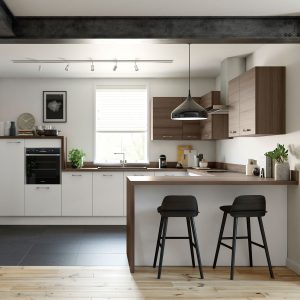
While in a large kitchen it may be easy to avoid fridge next to oven, what do you do in a smaller space? More bijou areas require a little more consideration and creative thinking.
'First, look at how practical the space is,' advises Simon Bodsworth. 'iIdentify the key walls in which to place tall and working furniture elements and consider access. This includes door swing and whether you will need to hang the fridge door from the left or the right.' This will help limit down where and how large your fridge can realistically be.
There are a few ways of tackling the fridge in a small kitchen dilemma. Firstly, look down. 'Specifying appliances for a small kitchen requires careful thought,' says Tom Howley. 'If you have set aside the space for a walkway of around a metre, standard oven or fridge doors will compromise a considerable portion of that space when opened.'
'A key tip is to fit built-under appliances. This will provide lots more workspace, leaving views across the kitchen at eye level uninterrupted. As a general rule, don’t sacrifice worktop space for an American style fridge-freezer or tall pantry.'
Another option is to consider your aesthetics. 'I would look to integrate it into the furniture,' says Andy Briggs. 'This way it becomes part of the overall design – keeping clutter out of a small room gives the perception of more space.'
Corners are another option. 'To prevent overcrowding in a small kitchen I would always suggest putting the fridge in the corner ' says Ashleigh Hanwell. 'If in use the fridge doors will be open and could block a walkway.'
Simon Bodsworth agrees. 'Choosing curved corner solutions will help you to maximise every inch of a bijou kitchen and you can also free up more space for refrigeration by thinking outside the box and ultimately find a solution that is both practical and aesthetically pleasing to the eye.'

Thea Babington-Stitt is the Managing Editor for Ideal Home. Thea has been working across some of the UK’s leading interiors titles since 2016.
She started working on these magazines and websites after graduating from City University London with a Masters in Magazine Journalism. Before moving to Ideal Home, Thea was News and Features Editor at Homes & Gardens, LivingEtc and Country Homes & Interiors. In addition to her role at Ideal Home, Thea is studying for a diploma in interior design with The Interior Design Institute.
-
 Everything you might not know about Ideal Home's history
Everything you might not know about Ideal Home's historyFrom Mary Berry's stint as Food Editor in the 1970s to the founding issue
-
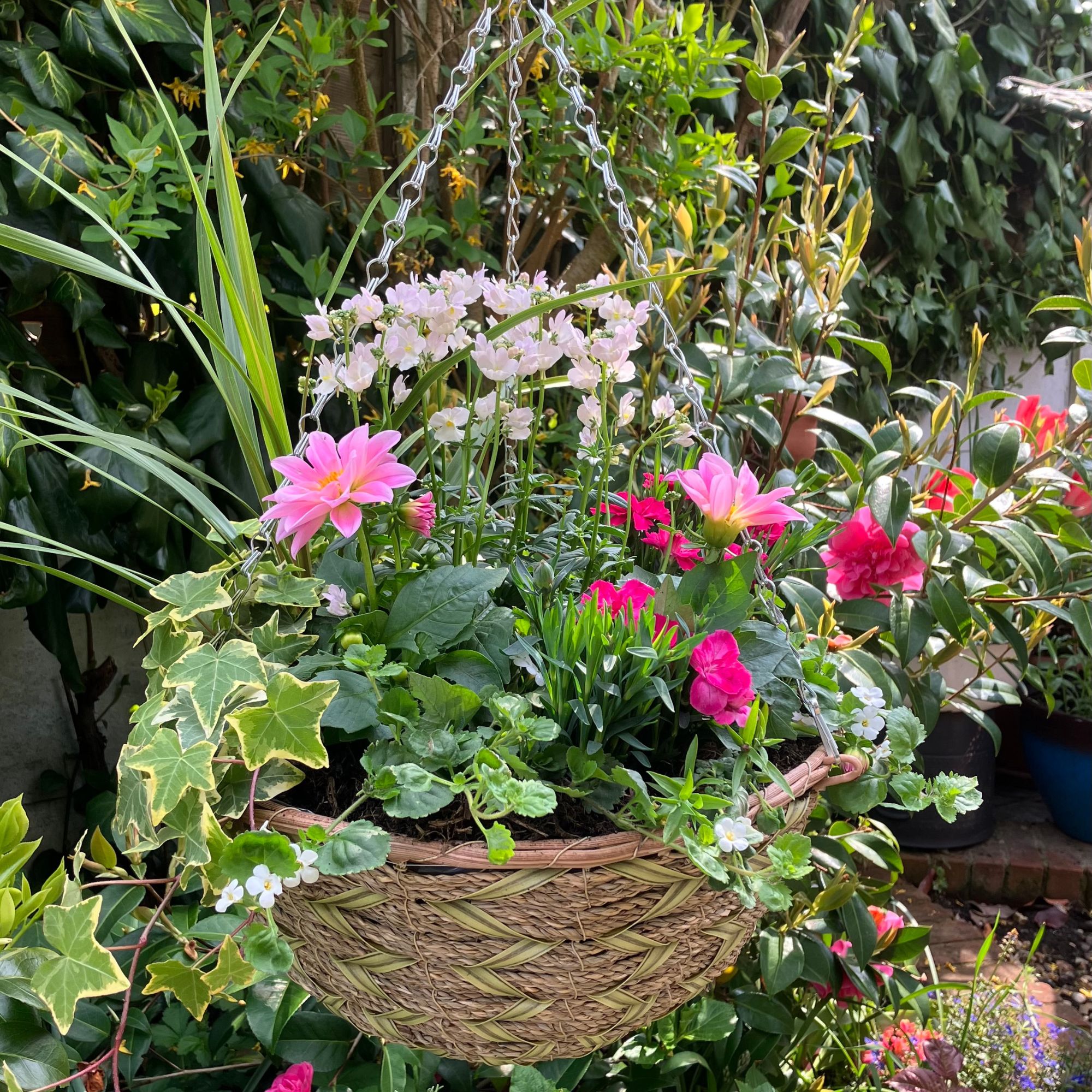 The easy planting technique I always use to create stunning hanging baskets - it's the secret to a show-stopping flower arrangement
The easy planting technique I always use to create stunning hanging baskets - it's the secret to a show-stopping flower arrangementIf you're not sure where to start when making up a hanging basket for the garden, the 'thriller, filler, spiller' method is worth a try
-
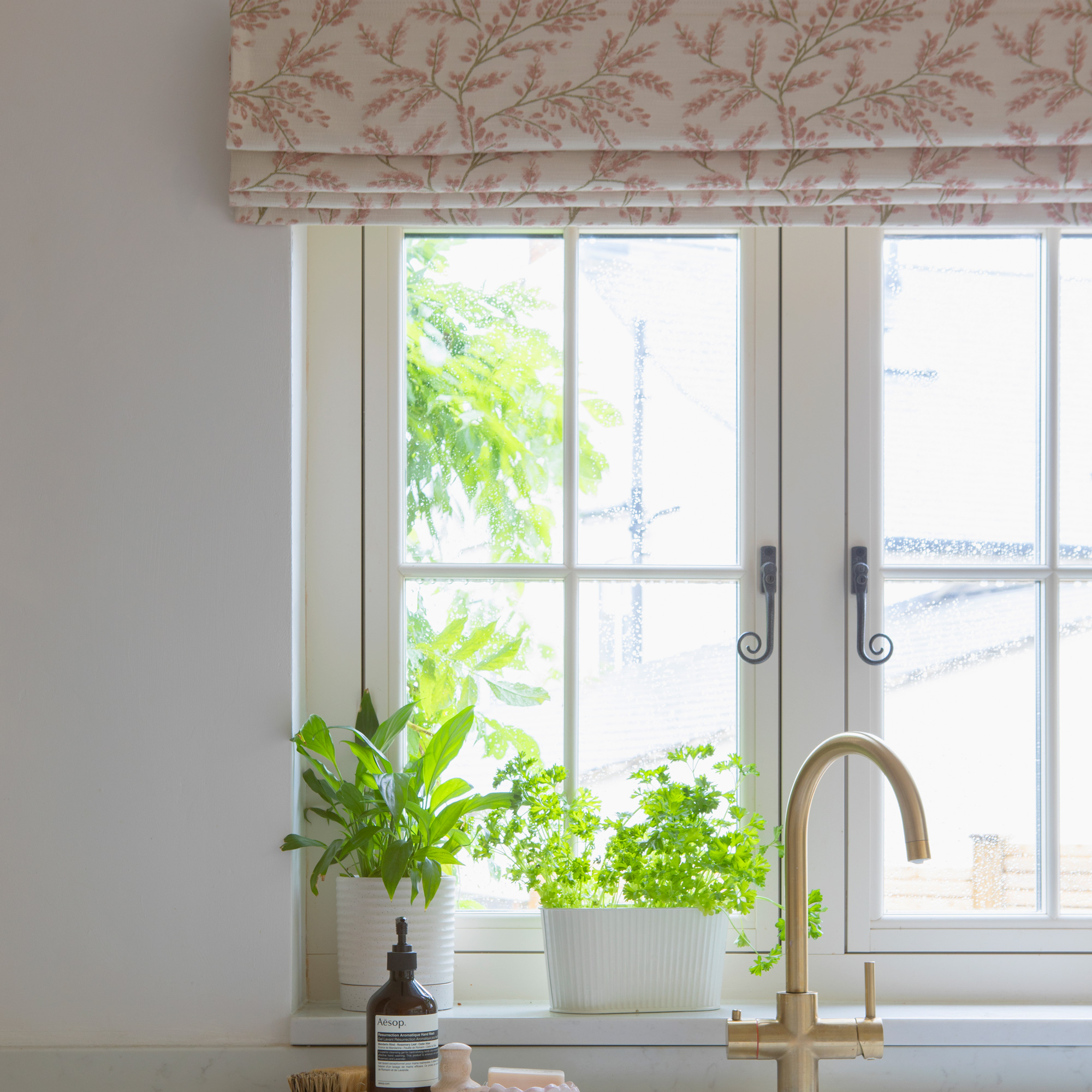 This £10 Amazon fix stopped pooling water from destroying the wall behind my kitchen sink – 6 months on, it still looks great
This £10 Amazon fix stopped pooling water from destroying the wall behind my kitchen sink – 6 months on, it still looks greatIf you're struggling with pooling water around your kitchen sink, listen up